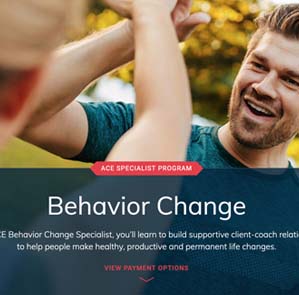
If you need evidence that the fitness industry is constantly evolving, look no further than the changes in ACE’s textbooks over the past quarter century. Before the ACE Group Fitness Instructor Handbook, there was the Aerobic Dance-Exercise Instructor Manual. Before The Professional’s Guide to Health and Wellness Coaching, there was the ACE Lifestyle and Weight Management Consultant Manual. Importantly, not only do job titles change over time, but the job descriptions often shift in response to the needs of clients, as well as advancements in the research that underpins those job roles.
For example, while a personal trainer has always been called a personal trainer here at ACE, the contents of that textbook have shifted over the years from a focus on sets, reps and other elements of exercise programming to a deeper look at exercise psychology, communication and the science of behavior change. This shift is reflective of the industry as a whole, as there seems to be an increasing awareness of the need to meet people where they are in their wellness journey and offer a personalized and more holistic approach to improving their health and wellness.
The following is a speculative look at where health coaching may be headed and how increasing behavior-change support may alter the day-to-day work of not only health coaches, but exercise professionals as well.
The Future of Health Coaching Is…
…Bright
Cedric X. Bryant, PhD, FACSM, President and Chief Science Officer for the American Council on Exercise, points to market research data to demonstrate just how bright the future is for health coaching:
The health coach market size in 2021 was $14.5 billion and is expected to grow to $26.0 billion by 2030, with an annual increase of nearly 7%.
At least 45,000 health coaching degrees and certifications are awarded each year.
Approximately 78% of people say wellness is more important now than ever before.
As the general public’s understanding of how health coaches can help them pursue health and wellness goals expands (more on this below), the profession is enjoying strong momentum that will continue well into the future. It’s not necessarily that the need for health coaching is growing, but that people are becoming increasingly aware that a more encompassing approach like that offered by health coaches will position them to be successful over the long run.
…Going to Change the Fitness Industry
In the future, says Dr. Bryant, “Successful exercise professionals are going to be those who really upskill in behavior coaching to serve as that trusted guide to help their clients on their respective journeys.” Even if personal trainers and other exercise professionals don’t want to earn a health coach certification, they will need to add behavior-change strategies to their repertoire if they want to succeed.
For the most part, people no longer need to be convinced of the importance of following a healthy lifestyle. People know what they should be doing, from exercising more and eating a healthier diet to better managing their stress and getting more sleep.
“The information is really irrefutable that being more physically active produces significant and profound improvements in a person’s health status,” explains Dr. Bryant, “particularly in terms of those chronic conditions that are really crippling us, from a productivity standpoint and from an economic standpoint.”
What we as an industry need to do is teach people how to translate their desired intentions into sustainable action. And that is where health coaching and lifestyle behavior change come into play—in bridging that gap.
The good news is that this evolution in the industry will serve to broaden the potential audience for ACE Certified Professionals and the industry as a whole. Health coaching can help us reach those people—which includes the vast majority of Americans—who don’t ever step foot in fitness facilities. This, says Dr. Bryant should serve as a wake-up call for owners and operators.
According to Janine Stichter, PhD, co-creator of the Healthy Behavior Institute, an educational platform for health coaches, personal trainers and anyone in the fitness and health area who wants to learn about how to use behavior psychology and behavior science to close the information/implementation gap, “the future is about looking at not only what happens in the gym, but also the other 23 hours of people’s days.” It’s about going beyond physical activity to help the general population get healthier. And she’s not referring only to physical health, but also those things that bring happiness and improved overall wellness.
It’s about being proactive and preventative, Dr. Stichter explains, as opposed to waiting until health challenges arise to address them.
…Better Defined
Dr. Stichter and her colleague Scott Schutte believe that the health coaching discipline needs to be better defined so that consumers know exactly what to expect when working with a specific professional. “The term ‘health coach’ is a very broad umbrella,” Dr. Stichter argues, which can confuse the consumer and doesn’t specify the expertise of the professional.
Will “health coaching” be the term we land on, Schutte wonders, and will there be “specialties” within that umbrella? He points to other terms currently in use, such as behavior-change coaching, habit coaching and weight-loss coaching, and urges all coaches to clarify the types of services they offer and understand how they can collaborate with others to best serve their clients.
Couple all of this with the fact that exercise professionals are increasingly using behavior-change strategies with their clients and you have a recipe for potential confusion. What’s the difference between a personal trainer who is also a behavior-change specialist and a certified health coach? What are the differentiators between habit coaching and weight-loss coaching?
These are questions that the industry needs to be able to answer with confidence and clarity.
Marina Borukhovich, CEO and founder of YourCoach, a practice-management platform for health coaches, agrees, saying that she is still often asked the difference between health coaching and personal training. “A clear distinction needs to be made about what each party does,” she says. “I’m a big believer in, everybody should do what they do best.”
…More Accessible
The mission of YourCoach.Health is to allow everyone to have access to health coaching. The COVID-19 pandemic made many people realize they need help when it came to health and wellness and they became more open to seeking out that support. Health coaching, Borukhovich explains, is for everybody.
She cites this as an opportunity for individual professionals, and the industry as a whole, to expand their reach. Consider that person who thinks they may not be the right fit for personal training or that they can’t keep up in a group fitness class—how can we reach them through health coaching? We all need someone to lean on and offer support, which is something a health coach can be.
Health coaches can sometimes bring people who are struggling or have fallen off track back into the fold. Gyms and personal trainers tend to reach the same people over and over again, but health coaching can help expand that base of potential customers.
The key, says Borukhovich, is to avoid assuming everyone is the same and using a cookie cutter approach. “Even the same person may need different things at different points in their health and wellness journey,” she says.
The truth is, health coaching really is for everyone. “I can’t think of a single person who wouldn’t benefit from some type of health coaching and lifestyle behavior-change support,” says Dr. Bryant.
Online health coaching is a vital element of accessibility. If someone is intimidated by the gym or has health and wellness goals that are unrelated to physical activity, online health coaching may be exactly what they need.
When asked how much of a shift she foresees from in-person coaching to online coaching, Borukhovich responds, “I think the shift has already been made.” While some coaches may work with clients at doctors’ offices or in workplace wellness or other locations, not many entrepreneurs are renting spaces to hang a shingle anymore, she explains.
The virtual space offers limitless possibilities in terms of reaching new people and expanding your business, says Borukhovich. Just as health coaches have become more comfortable working and meeting over Zoom or other online platforms, so has everyone else. Face-to-face interaction is no longer needed for the client to know there is a real person on the other end who cares about their health and wellness and has the expertise to help them reach their goals.
In the future, health coaches and fitness facilities will take advantage of technology to expand their reach and attain new clients who they might never have had access to before.
…More Collaborative
Dr. Bryant speculates that health coaches will serve a more integrated role in the healthcare system in the near future, which is something personal trainers and other exercise professionals have been seeking for decades. “Health coaching is the discipline that will help bridge that gap and serve as that critical link,” he says.
“Healthcare is starting to recognize the importance of being able to help individuals lead healthier lifestyles,” says Dr. Bryant. In fact, around 40% of ACE Certified Health Coaches are nurses and nutritionists looking for training and skill in behavior-change strategies like motivational interviewing, goal setting and working collaboratively with patients and clients.
Dr. Stichter agrees that health coaching could serve as that much-needed bridge between healthcare and the fitness industry. Instead of each type of professional practicing in their silos, she anticipates a future where we’re creating networks and support among health coaches, medical facilities, physical therapists, primary care physicians and community wellness programs, so that health coaches are part of an integrated team working collaboratively to deliver optimal care and help clients improve their health and wellness and reach their goals.
So, how might health coaches start making those connections and turn that vision into a reality? Dr. Stichter suggests health coaches use the same skills they use to build connections with a client to build a network of like-minded professionals. If a client has a healthcare team, whether that includes a physical therapist, cardiologist, registered dietitian or other specialists, reach out to them (with permission, of course). Let them know that you have the skills to help turn their guidelines into action.
Doctors and others in the healthcare field have limited time to talk to their patients, so the more they know about how to partner with health coaches, the better the outcomes for their patients.
There is also room for collaboration within the fitness industry, with health coaches referring out to exercise professionals when clients have exercise-related goals that need additional support, and personal trainers and group fitness instructors referring to health coaches when clients or class participants express an interest in pursuing a goal that falls outside the exercise professional’s area of expertise or scope of practice.
The bottom line here is that health coaching, along with the entire fitness industry and healthcare system, will be working collaboratively to optimize their services and maximize results for their patients/clients.
In Conclusion
No matter where health coaching is headed in the future, it’s vital that those of us in the fitness industry never lose sight of the fact that behavior science is a real science that is well established, not a “soft science” or a secondary approach to personal training. There is sometimes a lack of respect for this side of things in the fitness industry, even as more people recognize its value when working with clients.
Behavior science is used to design the layout of grocery stores and in advertisements we all see every day online and in the real world, so why not use that science to our advantage to better serve our clients and empower them to reach their health and wellness goals? As an industry, Dr. Stichter explains, we have to own the fact that we need to learn these strategies and implement them well.
We can’t be afraid to be creative when thinking about how to serve those clients who are new to the fitness industry. As an example, Dr. Stichter says that perhaps health coaches should rethink the hour-long session as the go-to model. Short, quick meetings can be used to help clients make small changes in their lives that add up over time.
Exercise professionals tend to think big and long-term: 30-day meal plans, 60-day fitness challenges, even 60-minute high-intensity interval training sessions. But a 15-minute coaching session to help a client overcome a particular challenge or to collaborate on how to build on a recent success is a great way to not only show clients that you’re there for them when they need you, but also to offer a different approach to health coaching.
Finally, no matter where health coaching is headed in the future, we must never lose sight of the individualized approach. Whether coaching is in-person, over Zoom or through some yet-to-be-invented medium, health coaches must meet each client where they are and determine the best way to empower them to succeed—no matter what success looks like to them. And that will never change.
Expand Your Knowledge
 |
The ACE Behavior Change Specialist Program teaches the key tools to promoting behavior change and creating a foundation for a healthy lifestyle. Learn how to help clients of all backgrounds recognize counterproductive behaviors and coach them to discover new methods to move more, eat better and make healthier decisions for themselves and their families.
|
|
 |
For experienced health coaches, exercise professionals and healthcare professionals ready to level up, this interactive course builds the advanced coaching skills you need to create an effective behavior change environment that aligns with your client's values and vision, and helps them overcome obstacles and negative thought patterns.
|





 by
by 




